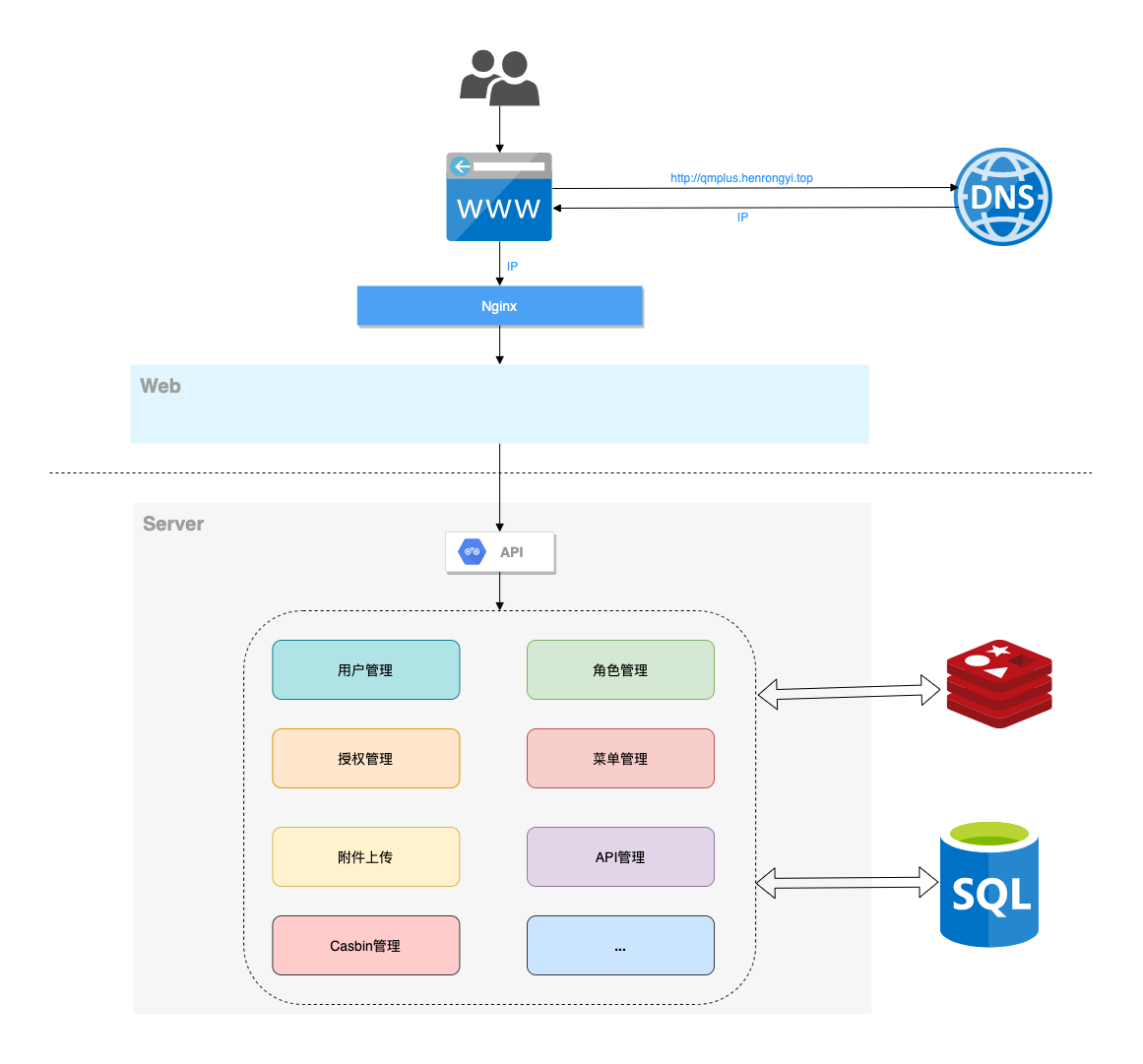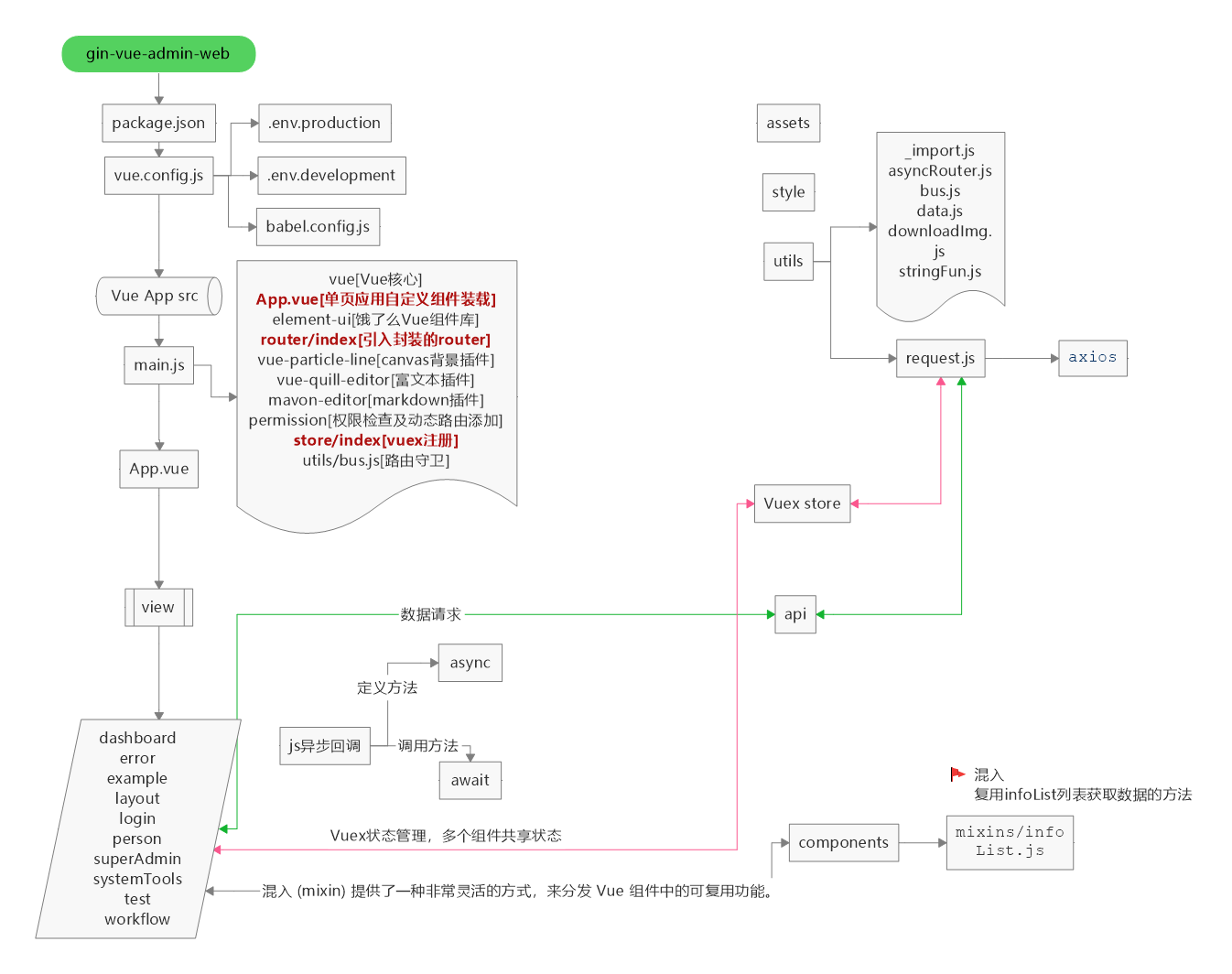English | 简体中文
Online Documentation : https://www.gin-vue-admin.com/
Development Steps (Contributor: LLemonGreen And Fann)
- Web UI Framework:element-ui
- Server Framework:gin
username:admin
password:123456
Gin-vue-admin is a full-stack (frontend and backend separation) framework designed for management system. It integrates multiple functions, such as JWT authentication, dynamic routing, dynamic menu, casbin authentication, form generator, code generator, etc. So that you can focus more time on your business Requirements.
Hi! Thank you for choosing gin-vue-admin.
Gin-vue-admin is a full-stack (frontend and backend separation) framework for developers, designers and product managers.
We are excited that you are interested in contributing to gin-vue-admin. Before submitting your contribution though, please make sure to take a moment and read through the following guidelines.
-
Issues are exclusively for bug reports, feature requests and design-related topics. Other questions may be closed directly. If any questions come up when you are using Element, please hit Gitter for help.
-
Before submitting an issue, please check if similar problems have already been issued.
-
Fork this repository to your own account. Do not create branches here.
-
Commit info should be formatted as
[File Name]: Info about commit.(e.g.README.md: Fix xxx bug) -
Make sure PRs are created to
developbranch instead ofmasterbranch. -
If your PR fixes a bug, please provide a description about the related bug.
-
Merging a PR takes two maintainers: one approves the changes after reviewing, and then the other reviews and merges.
- master: 2.0 code, for prod
- develop: 2.0 dev code, for test
- gin-vue-admin_v2_dev (v2.0 GormV1 Stable branch)
- gva_gormv2_dev (v2.0 GormV2 Development branch)
- node version > v8.6.0
- golang version >= v1.11
- IDE recommendation: Goland
- We recommend you to apply for your own cloud service in QINIU. Replace the public key, private key, warehouse name and default url address with your own, so as not to mess up the test database.
Use docker-compose to experience this project
-
Installation docker-compose Official document
-
# Install on Linux # 1.1 Run this command to download the current stable version of Docker Compose sudo curl -L "https://github.com/docker/compose/releases/download/1.26.2/docker-compose-$(uname -s)-$(uname -m)" -o /usr/local/bin/docker-compose # 1.2 Apply executable permissions to binary files sudo chmod +x /usr/local/bin/docker-compose
-
# Use Python's pip installation pip3 install docker-compose -i https://pypi.tuna.tsinghua.edu.cn/simple - Use Docker Desktop
-
-
Use git to clone this project
-
git clone https://github.com/flipped-aurora/gin-vue-admin.git
-
-
Use docker-compose up to start the startup project with one click
-
# Use docker-compose to start four containers docker-compose up # If you modify some configuration options, you can use this command to repackage the image docker-compose up --build # Use docker-compose to start in the background docker-compose up -d
-
Web project preview http://127.0.0.1:8000
-
swagger APIs http://127.0.0.1:8888/swagger/index.html
-
-
If the internal ip of the server's 177.7.0.12 container is occupied, the place to be modified is
- Replace 177.7.0.12 on line 39 of docker-compose.yaml with the ip you want
- Replace 177.7.0.12 in line 20 of .docker-compose/nginx/conf.d/my.conf with the ip you want
-
docker-compose uses a custom docker network
-
networks: network: ipam: driver: default config: - subnet: '177.7.0.0/16' -
Subnet address, the default gateway is 177.7.0.1 (docker-compose V2 needs to write, V3 does not need),For specific information, see the official document
-
The default network name is gin-vue-admin_network, and the default is bridge mode
-
If the subnet is modified, the ipv4_address of each service needs to be modified, and the ip of the server on line 20 of .docker-compose/nginx/conf.d/my.conf also needs to be modified
-
Use docker-compose to deploy this project need attention
- For mysql database, please use a local database installed on the server disk.
- Avoid using mysql in the docker container, there may be write problems, io is lower than the host machine, docker's persistence mechanism problem
- init.sql is for docker-compose ==experience this project==, prohibit the use of init.sql to initialize project data, Database initializationPlease use this method
- Use init.sql to initialize all problems, please bear it yourself, and have nothing to do with this project
- When deploying using docker-compose of this project,Please modify the nginx configuration, mysql configuration, networks configuration, redis configuration corresponding to docker-compose.yaml, and make changes as needed.
# clone the project
git clone https://github.com/piexlmax/gin-vue-admin.git
# enter the project directory
cd web
# install dependency
npm install
# develop
npm run serve# using go.mod
# install go modules
go list (go mod tidy)
# build the server
go buildZap log library usage guide && configuration guide
The configuration of the Zap log library selects zap under config.yaml
# zap logger configuration
zap:
level: 'debug'
format: 'console'
prefix: '[GIN-VUE-ADMIN]'
director: 'log'
link_name: 'latest_log'
show_line: true
encode_level: 'LowercaseColorLevelEncoder'
stacktrace_key: 'stacktrace'
log_in_console: true| Configuration Name | Type Of Configuration | Description |
|---|---|---|
| level | string | For a detailed description of the level mode, please see the official zap documentation info: info mode, stack information without errors, only output information debug: debug mode, stack details with errors warn:warn mode error: error mode, stack details with error dpanic: dpanic mode panic: panic mode fatal: fatal mode |
| format | string | console: Output log in console format json: json format output log |
| prefix | string | Log prefix |
| director | string | The folder to store the log can be modified, no need to create it manually |
| link_name | string | A soft connection file of link_name will be generated in the server directory, and the link is the latest log file of the director configuration item |
| show_line | bool | Display the line number, the default is true, it is not recommended to modify |
| encode_level | string | LowercaseLevelEncoder: lowercase LowercaseColorLevelEncoder: lowercase with color CapitalLevelEncoder: uppercase CapitalColorLevelEncoder: uppercase with color |
| stacktrace_key | string | The name of the stack, that is, the key of josn when outputting the log in json format |
| log_in_console | bool | Whether to output to the console, the default is true |
- Development environment || Debug environment configuration recommendations
level:debugformat:consoleencode_level:LowercaseColorLevelEncoder或者encode_leve:CapitalColorLevelEncoder
- Deployment environment configuration recommendations
level:errorformat:jsonencode_level: LowercaseLevelEncoder或者encode_level:CapitalLevelEncoderlog_in_console: false
- Suggestions are only suggestions, you can proceed according to your own needs, and suggestions are for reference only
go get -u github.com/swaggo/swag/cmd/swag
In mainland China, access to go.org/x is prohibited,we recommend goproxy.io
If you are using Go version 1.13 and above (recommended)
# Enable Go Modules function
go env -w GO111MODULE=on
# Configure GOPROXY environment variables
go env -w GOPROXY=https://goproxy.io,direct
If you are using Go version 1.12 and below
go env -w GO111MODULE=on
go env -w GOPROXY=https://goproxy.io
# Use the following command to download swag
go get -u github.com/swaggo/swag/cmd/swagcd server
swag init
After executing the above command,docs will show in server/,then open your browser, jump into http://localhost:8888/swagger/index.html to see the swagger APIs.
- Frontend: using
Element-UIbased on vue,to code the page. - Backend: using
Ginto quickly build basic RESTful API.Ginis a web framework written in Go (Golang). - DB:
MySql(5.6.44),usinggormto implement data manipulation, added support for SQLite databases. - Cache: using
Redisto implement the recording of the JWT token of the currently active user and implement the multi-login restriction. - API: using Swagger to auto generate APIs docs。
- Config: using
fsnotifyandviperto implementyamlconfig file。 - Log: using
go-loggingrecord logs。
4.2 Front-end Detailed Design Diagram (Contributor: baobeisuper)
├─server (backend)
│ ├─api (API entrance)
│ ├─config (config file)
│ ├─core (core code)
│ ├─docs (swagger APIs docs)
│ ├─global (global objet)
│ ├─initialiaze (initialiazation)
│ ├─middleware (middle ware)
│ ├─model (model and services)
│ ├─resource (resources, such as static pages, templates)
│ ├─router (routers)
│ ├─service (services)
│ └─utils (common utilities)
└─web (frontend)
├─public (deploy templates)
└─src (source code)
├─api (frontend APIs)
├─assets (static files)
├─components(components)
├─router (frontend routers)
├─store (vuex state management)
├─style (common styles)
├─utils (frontend common utilitie)
└─view (pages)
- Authority management: Authority management based on
jwtandcasbin. - File upload & download: File upload operation based on Qiniu Cloud (In order to make it easier for everyone to test, I have provided various important tokens of my Qiniu test number, and I urge you not to make things a mess).
- Pagination Encapsulation:The frontend uses mixins to encapsulate paging, and the paging method can call mixins
- User management: The system administrator assigns user roles and role permissions.
- Role management: Create the main object of permission control, and then assign different API permissions and menu permissions to the role.
- Menu management: User dynamic menu configuration implementation, assigning different menus to different roles.
- API management: Different users can call different API permissions.
- Configuration management: The configuration file can be modified in the web page (the test environment does not provide this function).
- Rich text editor: Embed MarkDown editor function.
- Conditional search: Add an example of conditional search.
- Restful example: You can see sample APIs in user management module.
fontend code file: src\view\superAdmin\api\api.vue
backend code file: model\dnModel\api.go
- Multi-login restriction: Change
userMultipointto true insysteminconfig.yaml(You need to configure redis and redis parameters yourself. During the test period, please report in time if there is a bug). - Upload file by chunk:Provides examples of file upload and large file upload by chunk.
- Form Builder:With the help of @form-generator.
- Code generator: Providing backend with basic logic and simple curd code generator.
- upload & export Excel
- e-chart
- workflow, task transfer function
- frontend independent mode, mock
https://www.yuque.com/flipped-aurora
There are video courses about frontend framework in our blo. If you think the project is helpful to you, you can add my personal WeChat:shouzi_1994,your comments is welcomed。
(1) Development environment course
(2) Template course
(3)2.0 version introduction and development experience
Bilibili:https://www.bilibili.com/video/BV1aV411d7Gm#reply2831798461
(4) Golang basic course (coming soon)
https://space.bilibili.com/322210472/channel/detail?cid=108884
 |
If you find this project useful, you can buy author a glass of juice 🍹 here
If you use this project for commercial purposes, please comply with the Apache2.0 agreement and retain the author's technical support statement.








